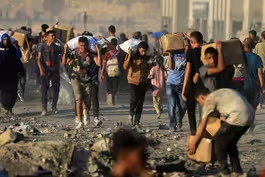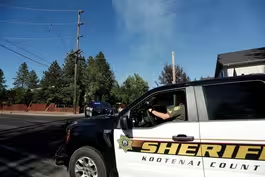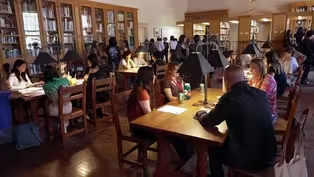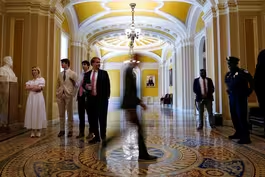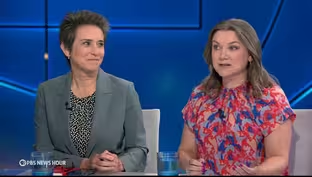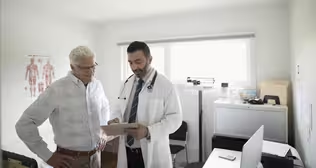
Operation Not Forgotten sends agents to Native cold cases
Clip: 6/30/2025 | 9m 42sVideo has Closed Captions
Operation Not Forgotten dedicates FBI agents to cold cases as Native families seek answers
For decades, Native Americans and Alaskan Natives have experienced disproportionately high rates of murder, rape and other violent crimes. Experts say it's an outcome of generational trauma and systemic abuse. Stephanie Sy reports from New Mexico, where a lack of law enforcement resources is just one reason why so many of these cases are never solved. It's part of our series, Race Matters.
Problems playing video? | Closed Captioning Feedback
Problems playing video? | Closed Captioning Feedback
Major corporate funding for the PBS News Hour is provided by BDO, BNSF, Consumer Cellular, American Cruise Lines, and Raymond James. Funding for the PBS NewsHour Weekend is provided by...

Operation Not Forgotten sends agents to Native cold cases
Clip: 6/30/2025 | 9m 42sVideo has Closed Captions
For decades, Native Americans and Alaskan Natives have experienced disproportionately high rates of murder, rape and other violent crimes. Experts say it's an outcome of generational trauma and systemic abuse. Stephanie Sy reports from New Mexico, where a lack of law enforcement resources is just one reason why so many of these cases are never solved. It's part of our series, Race Matters.
Problems playing video? | Closed Captioning Feedback
How to Watch PBS News Hour
PBS News Hour is available to stream on pbs.org and the free PBS App, available on iPhone, Apple TV, Android TV, Android smartphones, Amazon Fire TV, Amazon Fire Tablet, Roku, Samsung Smart TV, and Vizio.
Providing Support for PBS.org
Learn Moreabout PBS online sponsorshipAMNA NAWAZ: For decades, Native Americans and Alaskan Natives have experienced disproportionately high rates of murder, rape and other violent crimes, an outcome, experts say, of generational trauma and systemic abuse.
Tackling the issue has been a rare bipartisan effort.
President Trump is now continuing a Justice Department program to surge FBI agents to help solve cases of missing and murdered indigenous people.
As Stephanie Sy reports from New Mexico, a lack of law enforcement resources is just one reason why so many of these cases are never solved.
It's part of our ongoing series Race Matters.
(LAUGHTER) STEPHANIE SY: Giggles in the breathless joy of childhood breathe life into the dusty Jemez Pueblo.
The grandkids are all right, but it wasn't always so.
GERALDINE TOYA, Mother of Shawna Toya: So, Shawna actually had four kids, three girls and one boy.
Wilson (ph) was her only boy she had.
And it was actually the hardest to, yes, comfort him when she passed.
STEPHANIE SY: Geraldine and Benjamin Toya are potters by trade.
They work while they reminisce about their late daughter.
BENJAMIN TOYA, Father of Shawna Toya: She used to follow me around everywhere I go.
STEPHANIE SY: In July of 2021, Shawna was with Geraldine at a family party.
About six hours later, Geraldine got a call in the dead of night.
GERALDINE TOYA: When I got that call that morning at 3:15 to say that they found my daughter deceased at a park and her ride, you know, it was like a bad dream.
That's what I wanted to see it as, because I just saw her.
I just spoke with her.
It can't be here.
it can't be her.
STEPHANIE SY: The incident report says EMTs tried CPR on Shawna, but she was beyond help.
In the postmortem examination, tests showed she had methamphetamines, fentanyl and alcohol in her system, indicating an accidental overdose.
GERALDINE TOYA: They told me that they found out that they didn't see that there was any foul play.
And they immediately kind of labeled her as a person that had, I guess, caused trouble on the streets, homeless, and did a lot of drugs.
And I said, that's not her.
STEPHANIE SY: The Toyas say they have reason to believe Shawna may have been killed.
GERALDINE TOYA: She had actual bruises on her face and her lip was like -- was swollen.
She had bleeding from her neck.
She had gravel all over her back.
And I said, what in the world?
What happened?
Did they just throw her in the freezer?
STEPHANIE SY: To potters, the details matter.
The Toyas noticed Shawna's car contained empty grocery bags and an empty wallet, a sign she was robbed, they say.
And they found another woman's I.D.
in the car, something not mentioned in the police incident report.
Among other things the Toyas claimed were overlooked, Shawna was wrongly labeled male in one of the medical examiners reports.
GERALDINE TOYA: They just sent her home like she was nobody.
STEPHANIE SY: The Albuquerque Police Department did not respond to a request for comment.
But the Toyas are convinced that Shawna's case fits in with thousands of other unsolved violent crimes against Native Americans.
ELIOT NEAL, Assistant U.S. Attorney: It's a crisis.
Tribal communities experience disproportionate levels of violent crime, and we have to work as hard as we can to address that.
STEPHANIE SY: Eliot Neal is an assistant U.S. attorney based in New Mexico, specifically assigned to address missing and murdered indigenous people cases, or MMIP, in the Southwest.
Under federal law, the FBI works with tribes to investigate major crimes in Indian country.
ELIOT NEAL: Crimes like domestic violence, assaults, things like that, child abuse, child sexual abuse, things like that are sort of MMIP precursors that lead to those deaths.
STEPHANIE SY: There are at least 4,300 cases of unsolved violent crimes against Native Americans across the country.
Operation Not Forgotten will surge 60 Department of Justice personnel, including FBI agents, in the next six months to help investigate those cases.
The agents will be deployed to 10 FBI field offices across the country, rotating in 90-day assignments.
DARLENE GOMEZ, Attorney: We owe it to Native Americans as the first people of this land.
We should be trying to solve their cases with the utmost respect and the utmost due diligence.
STEPHANIE SY: Darlene Gomez is an attorney and advocate for missing and murdered indigenous people based in Albuquerque.
One of the cases she's advocated authorities pursue further is that of Calvin Martinez, who has been missing since 2019.
BECKY MARTINEZ, Sister of Calvin Martinez: He lost his wife and his son in a family fire in 2014.
It was midnight December 23, 2014.
I woke up and I heard my brother yelling.
And I got up and went outside.
And I'd just seen his whole trailer on fire.
And he got out, and I think he went back in to grab the baby and her, and she fell over.
WOMAN: And we don't have the resources to figure out where they are at or who has them.
STEPHANIE SY: Becky Martinez, Calvin's sister, says the he struggled for the next five years, using drugs and alcohol.
She says, when he disappeared, he was living between places.
And because he didn't have an address, the county referred the family to the Navajo Nation police.
BECKY MARTINEZ: And then the Navajo Police Department points us to Farmington.
And then Farmington said that they couldn't help.
I think I just -- I just felt like the door just kept getting slammed in each direction I turned.
I didn't have no help.
I didn't have no resources.
I didn't know who to turn to.
STEPHANIE SY: Jurisdictional confusion is a common feature in missing persons cases involving tribal members, but is only one challenge to solving these cases, says attorney Darlene Gomez.
DARLENE GOMEZ: Everybody in Indian country knows, if you want to kill somebody and get away with it, you go to Indian country.
The lack of officers to respond to calls, the remoteness, oftentimes, you have no cell service.
You have no radio service.
The 911 calls are being manned by -- outside of the reservation by county 911 resource centers.
What I have seen is cases that should have been investigated further by calling either a criminal investigator or the FBI don't even make it to that level because the officer is like, oh, it's an unintended death or comes up with some other reason not to consider it a major crime.
WOMAN: Right now, I'm out in Farmington, New Mexico, for Operation Not Forgotten.
STEPHANIE SY: The FBI put out this video last year of a special agent working a 4-year-old case.
The agent searches for clues in an open field.
Crucially, in this case, a body had been found.
DARLENE GOMEZ: The U.S. attorney's office is not going to prosecute a case without a body.
STEPHANIE SY: U.S. attorneys generally decide which major crimes to prosecute.
There are thousands of Indian country families that want answers.
And what you're saying is, you cannot necessarily promise more prosecutions.
ELIOT NEAL: We have a duty to the public to prosecute cases where we can prove that a crime occurred beyond a reasonable doubt, right?
If we don't feel like we can do that at a particular point, we can't bring that case.
It's not fair of us to bring that case.
STEPHANIE SY: In the latest statistics from the Department of Justice, U.S. attorneys most commonly cited reason for declining to prosecute cases in Indian country was insufficient evidence.
ELIOT NEAL: These are tight-knit, small communities.
For almost every case I have looked at, we're pretty confident that people in the community know what happened.
STEPHANIE SY: Georgiana Harrison believes it is why her sister Ranelle Rose Bennett has been missing since 2021.
GEORGIANA HARRISON, Sister of Ranelle Rose Bennett: That's the only thing that I wish people would do.
I don't know what kind of thrill they have from withholding information.
STEPHANIE SY: Do you think that there's people in the community, on that reservation that are withholding?
GEORGIANA HARRISON: Definitely.
Definitely.
There's people out there that are withholding information and they need to -- if they see something, say something.
Tell somebody.
There's kids out here hurting.
There's mothers out here hurting.
What if it was their children?
STEPHANIE SY: The search for answers also looms over the Toyas back on the Jemez Pueblo.
The kids have gone to counseling and Wilson no longer goes to bed hoping his mom will be there when he wakes.
The youngest girl Shaylee (ph), reminds them of Shawna.
GERALDINE TOYA: She's just like her mom.
Her mom used to sing everywhere she went.
And every time she was going to talk, it was more in singing than talking.
(LAUGHTER) STEPHANIE SY: Geraldine Toya says its the grandkids that motivate her continued quest to try and get the case reopened.
For the "PBS News Hour," I am Stephanie Sy on the Jemez Pueblo in New Mexico.
Dozens in Gaza killed as U.S. makes new push for ceasefire
Video has Closed Captions
Clip: 6/30/2025 | 5m 18s | Dozens in Gaza killed by Israeli strikes and gunfire as U.S. makes new push for ceasefire (5m 18s)
News Wrap: Alleged gunman in firefighter ambush identified
Video has Closed Captions
Clip: 6/30/2025 | 10m 1s | News Wrap: Idaho investigators identify alleged gunman in firefighter ambush attack (10m 1s)
The power of stories helps young people overcome differences
Video has Closed Captions
Clip: 6/30/2025 | 7m 58s | The power of stories helps young people overcome differences (7m 58s)
Some Senate Republicans voice concerns over Medicaid cuts
Video has Closed Captions
Clip: 6/30/2025 | 5m 32s | Senate pushes to pass Trump's budget as some Republicans voice concerns over Medicaid cuts (5m 32s)
Tamara Keith and Amy Walter on GOP opposition to Trump bill
Video has Closed Captions
Clip: 6/30/2025 | 7m 39s | Tamara Keith and Amy Walter on Trump's big bill facing GOP opposition (7m 39s)
Who would be affected by health care cuts in Trump's budget
Video has Closed Captions
Clip: 6/30/2025 | 6m 29s | Who would be affected by health care cuts in Senate version of Trump's budget bill (6m 29s)
Providing Support for PBS.org
Learn Moreabout PBS online sponsorshipSupport for PBS provided by:
Major corporate funding for the PBS News Hour is provided by BDO, BNSF, Consumer Cellular, American Cruise Lines, and Raymond James. Funding for the PBS NewsHour Weekend is provided by...
